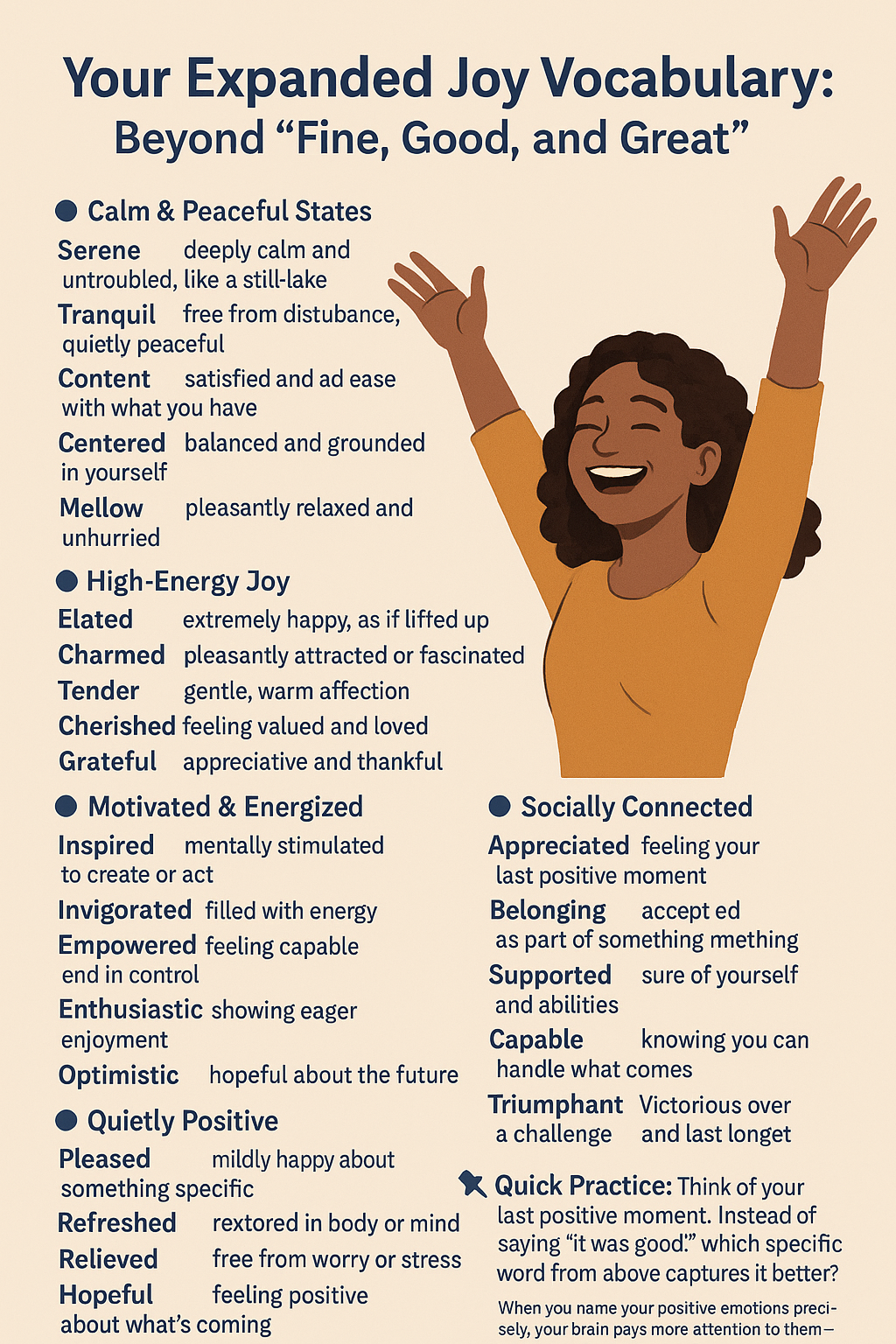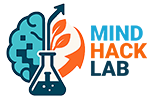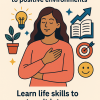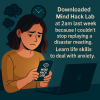The Mind Hack Lab Framework (Yeah, There's Actually a Method to This)
Look, I get it. Another framework. Another system. But here's the thing — these 10 pillars? They're literally everything that's been kicking my ass for years, organized into something that actually makes sense.
Thirty minutes to stop the spiral. Thirty days to start the fix. Stick around longer to master it.
So I discovered something at 3 AM last Tuesday. Every single panic spiral, every frozen presentation moment, every "why can't I just DO THE THING" — it all fits into one of these 10 categories. And apparently LinkedIn says these are the exact skills that get people promoted? Wild.
The kicker: We use AI coaches exclusively. No awkward video calls with Brad the life coach at 7 AM. Just you, your brain, and an AI that remembers your specific flavor of panic without making it weird.
When your brain decides every meeting is a bear attack
The Usual Suspects:
That presentation tomorrow. Being put on the spot. "Quick question" that's never quick. Difficult conversations you've been avoiding for 6 months.
What You Actually Learn:
- Why your chest gets tight (spoiler: interoception stuff)
- Some breathing thing that actually works
- How to not look like you're dying inside
Career Translation:
- Being the one who doesn't panic = leadership material
- Confidence under pressure = remembered at review time
- Executive presence (whatever that means)
For when everything feels pointless but rent still exists
Rock Bottom Looks Like:
Can't get out of bed. Rejection hitting different. That "what's the point" feeling. Sunday scaries turning into everyday scaries.
What Changes:
- Finding motivation without the fake positivity BS
- Bouncing back faster (or at least bouncing)
- That emotion construction thing Lisa Feldman Barrett talks about
Why Companies Care:
- Consistent performance = promotable
- Not burning out = actually finishing projects
- Initiative when others are fried = noticed
Because 3 AM anxiety spirals aren't a personality trait
The Nightly Battle:
Brain won't shut up. Replaying that stupid thing from 2019. Tomorrow's meeting on repeat. Body tired, mind WIRED.
30-Minute Fix Includes:
- Some counting pattern (4-something-8?)
- Why your nervous system thinks it's still Tuesday
- Actually falling asleep without substances
The Work Impact Nobody Talks About:
- Sleep = consistent output = trusted employee
- Not looking exhausted in meetings = executive presence
- Energy to actually network after 5 PM
Stop letting work colonize your entire existence
Current Situation:
Slack notifications at 11 PM. Weekend = catch up time. Vacation = working from beach. "Quick sync" becoming your villain origin story.
What Actually Helps:
- Setting boundaries without career suicide
- The planning fallacy thing (why everything takes 3x longer)
- Stress that helps vs stress that destroys
ROI of Not Being a Stress Case:
- Reliability = promotion track
- Not burning out = still there for the good opportunities
- Gallup says burnout costs $8.8T globally (your share: that missed raise)
Imposter syndrome can eat my entire ass
The Internal Monologue:
"They'll figure out I'm faking it." Everyone else seems smarter. That comparison trap. Waiting for someone to expose you.
What Changes in 30 Days:
- Actually believing your own resume
- Speaking up without the 47-step internal debate
- Some CBT thing about thoughts not being facts
Money on the Table:
- Self-advocacy = asking for that raise
- Confidence = applying for stretch roles
- Not underselling yourself = $$$ over career
Why is starting so fucking hard?
The Procrastination Special:
47 browser tabs. Organizing desk instead of working. Analysis paralysis. Starting 19 projects, finishing zero.
30 Minutes Gets You:
- Breaking the "just start" barrier
- Something about dopamine and rewards
- Actually finishing things (revolutionary)
What Your Boss Sees:
- Delivers on time = dependable
- Finishes projects = gets more opportunities
- McKinsey says productivity skills = core capability
For brains with 73 tabs open and growing
Daily Chaos:
Can't focus for 5 minutes. Phone addiction winning. Meetings = daydream time. Starting 10 things, remembering none.
The AI Coach Helps With:
- Attention management that isn't "just try harder"
- Impulse control (apparently that's learnable?)
- Working with your brain, not against it
Professional Translation:
- Focus = quality work = promotions
- Organization = trusted with big projects
- Digital discipline = not the person checking phone in meetings
When life goes completely off-script
Plot Twists Include:
Layoffs. Breakups. Loss. Moving. Everything changing at once. That "this wasn't the plan" feeling.
Building Back:
- Processing without falling apart
- Finding meaning in the mess
- Brief interventions for acute stress (that actually work)
Career Survival Skills:
- Change management = leadership quality
- Adaptability = surviving reorgs
- Resilience = the one still standing when others quit
Stop letting anger and guilt run your whole life
The Emotional Shitstorm:
Rage at minor inconveniences. Guilt about everything. Can't let go of that thing from 2019. Shame spiral professional.
What You Learn:
- Emotions are predictions? (Lisa Feldman Barrett was right)
- Anger management that isn't "just breathe"
- Self-compassion without the woo-woo
Executive Presence Requires:
- Not losing it in meetings = leadership material
- Handling feedback = growth mindset points
- Emotional control = C-suite potential
Turns out humans need other humans (annoying but true)
The Isolation Station:
Working remote = forgetting how to human. Network events = nightmare. Small talk = rather die. Feeling alone in a full office.
AI Coach Shows You:
- Authentic connection (not LinkedIn fake)
- Navigating conflict without burning bridges
- Actually listening (harder than it sounds)
LinkedIn's #1 Skill for 2025:
- Communication skills = promotions
- Relationship building = opportunities find you
- Conflict resolution = trusted with teams
OK So Here's What Nobody Tells You
Every single one of these skills? They're all connected. Fix your sleep, suddenly you can focus. Manage stress, confidence goes up. It's like your brain has been playing life on hard mode and someone finally showed you the settings menu.
The Emotional Intelligence Part
- Finally understanding WTF you're feeling
- Not letting emotions hijack your whole day
- Reading rooms without being creepy
- Navigating office politics like an adult
The Career ROI Part
- Showing up consistently (bare minimum, still counts)
- Speaking without your voice shaking
- Being the calm one when shit hits fan
- Actually collaborating (not just cc'ing)
The Science-y Part
- Your patterns aren't your personality
- Interrupting spirals before they start
- Techniques based on actual research
- Building new neural pathways (sounds fake but isn't)
Real talk: McKinsey says improving well-being could unlock $11.7T in value. For you? That means more energy, better focus, and being the one who gets tapped for opportunities while everyone else is burning out.
The AI coach doesn't judge when you practice the same anxiety technique 47 times at 3 AM. No awkward "how does that make you feel" conversations. Just you, figuring out how to stop self-sabotaging, one 30-minute session at a time.
Pick Your Biggest Problem & Start Fixing It
Thirty minutes to stop the spiral. Thirty days to start the fix. Stick around longer to master it.









